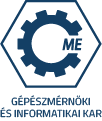| Course objectives: |
| systematic presentation of the elements of structural integrity; characterising of the welded structures and the discontinuities in welded joints; overview of different life-time estimation and management methods, and their applicability based on case studies |
| Course content and structure: |
| Conceptual model of structural integrity: global, experimental and information-technical aspects. Characteristics of welded structures and structural elements, types of structures, typical structures. Design of welded structures, materials characteristics. Investigations of welded structures and welded joints. Discontinuities in welded joints and their evaluation methods: workmanship criteria and engineering critical assessment methods. Life-time concepts: life-time, remaining life-time, remaining life-time functions, life-time management. Engineering and fracture mechanical approaches of life-time management. Case studies: bridges, pressure vessels, transporting pipelines. |
| Evaluation method: |
| written and oral exam at the end of semester |
| Required reading: |
| NAUBEREIT, H.; WEIHERT, J.: Einführung in die Ermüdungsfestigkeit. Carl Hanser Verlag, München-Wien, 1999.BARSOM, J. M.; ROLFE, S. T.: Fracture and fatigue control in structures. ASTM, West Conshohocken, 1999.LIU, F. A.: Structural life assessment methods. ASM International, Materials Park, 1998. |
| Suggested reading: |
| KELLER, A. P.: Bruchmechanik druckbeanspruchter Bauteile. Verlag TÜV Rheinland, München-WIEN-Köln, 1990.MUHLBAUER, K. W.: Pipeline risk management manual. Ideas, techniques, and resources. Elsevier – Gulf Professional Publishing, 2004.BUCHMAYR, B.: Computer in der Werkstoff- und Schweisstechnik Deutscher. Verlag für Schweisstechnik. Düsseldorf, 1991. |


